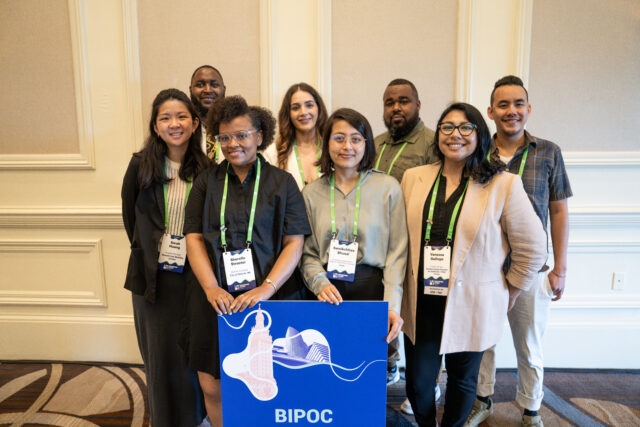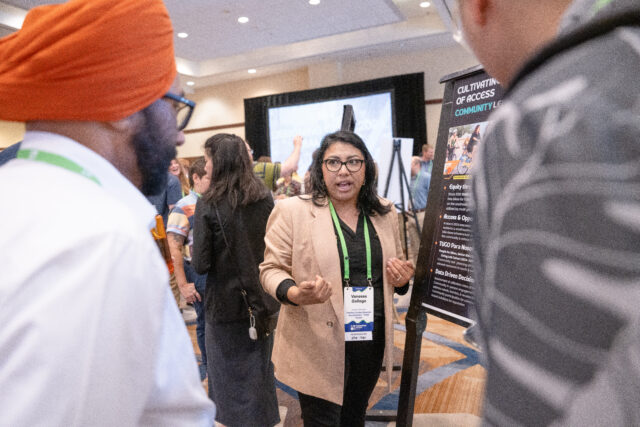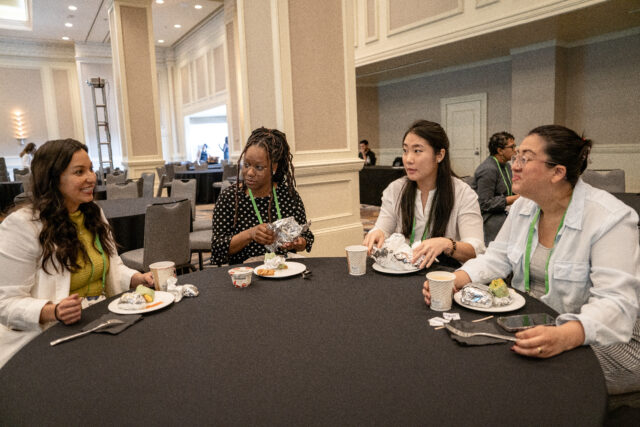Transportation Justice Fellows look back on their micromobility equity work
by Fielding Hong, NACTO Program Manager
June 24, 2024
The Better Bike Share Partnership (BBSP) celebrated the conclusion of its 2023-2024 Transportation Justice Fellowship program earlier this month with a ceremony recognizing this year’s cohort of eight transportation professionals.
Congratulations to our 2023-2024 Transportation Justice Fellows for completing the program!

- Back row from left: Ricky Reed, expansion specialist at POGOH; Carol Antunez, senior manager of government relations at Lime; Prentis Grayson, senior manager of outreach and advocacy at Trailblazers; Bryan Nguyen, shared micromobility coordinator at Portland Bureau of Transportation
- Front row from left: Sarah Huang, program manager at the Shared-Use Mobility Center; Sherelle Streeter, senior mobility strategist at Detroit’s Office of Mobility Innovation; Samikchhya Bhusal, policy manager at Forth; Vanessa Gallego, program manager of bike program at Families United Gaining Accessibility (FUGA)
The Fellowship, a first-of-its-kind program launched in 2021, builds community and skills among people of color working to embed mobility justice in transportation. Led by the National Association of City Transportation Officials (NACTO) and open to early- to mid-career professionals based in the U.S., the Fellowship supports and sustains the people doing the heavy work to operationalize equity across the transportation field.
The 2023-2024 Fellowship launched last fall, focused on shared micromobility as a critical tool for building transportation justice. The eight fellows work in all sectors of shared micromobility, including government agencies, nonprofits, advocacy organizations, and private operators. Over the course of the past eight months, fellows met regularly with NACTO, BBSP, and facilitators from Transforming Change to build community and explore ways to operationalize equity in the field of transportation. Fellows attended targeted skills-building sessions, collaborated on small projects, and received one-on-one coaching from experts working at the intersections of transportation and social justice.
The Fellows also played a key part in planning portions of this year’s Designing Cities Conference in Miami-Dade, Florida. They facilitated discussions at BBSP’s annual Shared Micromobility Roundtable, organized a BIPOC Breakfast meet and greet, and shared their achievements with conference participants during the Meet the Cities event.
Transportation leaders, planners, engineers, advocates, and more participated in the roundtable — a half-day, in-depth working session focused on the essential elements of an equitable shared micromobility program. Through a mix of panel discussions, presentations, and group activities, attendees shared best practices, collaborated on common challenges, and identified operational and regulatory strategies that support equitable shared micromobility programs. Lively discussions included municipal funding of shared micromobility, opportunities and challenges of nonprofit bike share systems, physical and financial access, and the benefits of micromobility electrification. Fellows led conversations specific to their work in their respective cities and guided the conversations around the understanding that people need to: see their community on bikes, understand the value of shared micromobility to their community and city, and be supported in learning how to use the program.
At the Meet the Cities event, three fellows shared updates on personal research projects. Sarah Huang highlighted issues of intersectionality from a series of interviews with queer BIPOC transportation planning professionals. Ricky Reed highlighted key findings from a series of community surveys on shared micromobility in BIPOC communities across Pittsburgh. Vanessa Gallego presented community-driven plans for bike station infrastructure in Tucson, Arizona.

Vanessa Gallego, program manager of bike program at Families United Gaining Accessibility (FUGA), presents on community-driven plans for bike station infrastructure in Tucson, Arizona. Photo by NIBA Photography, LLC
At the BIPOC Breakfast meet and greet, attendees connected with other BIPOC in the transportation industry, had professional headshots taken, and could sign up to win a copy of “Inclusive Transportation,” Veronica O. Davis’ recent book. Veronica O. Davis attended the breakfast and shared a few words with the room. She emphasized — and the energy of the room reflected — that BIPOC are at the transportation and mobility table, BIPOC belong at the table, and BIPOC are essential to the work of designing cities where all people can thrive.

Transportation industry professionals at the BIPOC Breakfast. Photos by NIBA Photography, LLC
At a June 6 ceremony acknowledging the end of this year’s program, BBSP, Transforming Change, Fellowship alumni, and the fellows’ coaches had the opportunity to share reflections on the fellows’ achievements and growth.
“At first, I was nervous about what people would think of me and if I was going to fit in with this group, being that I didn’t have as much experience as a lot of the other fellows,” shared one fellow. “But after that first meeting, the group helped me get comfortable and I just learned more from everybody in the group. I learned that everybody in the group was like family, we all just bonded together in those meetings. And all the things I learned about shared micromobility over the past sessions, has helped me better apply myself at my job to make my city better.”
If you’re interested in applying for the 2024-2025 Transportation Justice Fellowship, applications will open in late August. Stay tuned for more information! In the meantime, read on for reflections from four of the fellows on their experiences in the program.
Reflections From the Fellows:
WHAT HAS BEEN YOUR FAVORITE MOMENT FROM THE FELLOWSHIP OVERALL?
“I enjoyed learning from skill session speakers who are advancing transportation justice across various sectors including city DOTs, nonprofits, and private consulting. Their stories gave me inspiration for how I can push for transportation justice regardless of the sector or employer I may be a part of at a given time.”
– Samikchhya Bhusal, policy manager at Forth
“Participating in the Transportation Justice Fellowship has been a transformative experience for me. It has allowed me to forge connections with fellow BIPOC transportation professionals in both the micromobility and active transportation sectors. This fellowship provided a unique platform for collective growth that would have otherwise been inaccessible. Moreover, it shattered the isolation of feeling like the lone BIPOC individual in professional settings, revealing a supportive community where we can unite to effect tangible change.”
– Prentis Grayson, senior manager of outreach and advocacy at Trailblazers
WHAT HAVE YOU LEARNED ABOUT TRANSPORTATION JUSTICE/EQUITY THROUGH THIS FELLOWSHIP?
“That it’s a part of our everyday life and we see it everyday we live through it. If there’s a lack of equity in the transportation system in only BIPOC neighborhoods or poor neighborhoods then there isn’t equity happening and something should be done about it.”
– Ricky Reed, expansion specialist at POGOH
“That we must align our resources with our commitments. Time and money are often the biggest resources an individual, organization, and an entity has. I’ll be thinking about this alignment a lot more personally and in my own work. We face multiple crises — poor air quality, housing and transportation unaffordability, police brutality, climate injustice, and this list goes on. Amidst these crises, we must practice hope and joy and practice this with a community of trusted peers.
I also learned that engaging the community even before the formal community engagement has taken place is key. I’ve learned that there is a difference between community collaboration and community cheerleading; we want to be aiming for authentic collaboration and not just signatures of support on an initiative.
Another big learning was that we must imagine boldly for the just futures we want to be a part of.”
– Samikchhya Bhusal, policy manager at Forth
WHAT WERE YOUR FAVORITE MOMENT(S) FROM THE #NACTO2024 DESIGNING CITIES CONFERENCE?
“One of the highlights from the NACTO 2024 Designing Cities Conference was the opportunity to engage with transportation professionals from across the country, particularly my peers in the Transportation Justice Fellowship. It was enriching to delve into conversations about the impactful work each person is contributing to in their respective roles. The BIPOC Breakfast meet and greet was such a meaningful and favorite moment for me. Connecting and listening to Veronica O. Davis speak and inspire a room full of BIPOC transportation professionals was truly empowering.
– Prentis Grayson, senior manager of outreach and advocacy at Trailblazers
WHAT WERE YOUR MAJOR TAKEAWAYS FROM THE BBSP ROUNDTABLE?
“The BBSP Roundtable really emphasized to me the importance of incorporating equity throughout the design and development of bike share programs. As a BBSP Transportation Justice Fellow, I had the privilege of leading a discussion focused on the challenges of insurance requirements, and it was very insightful and helpful to get input from others in the field.”
– Sarah Huang, program manager at the Shared-Use Mobility Center
WHY DO YOU THINK A FELLOWSHIP LIKE THIS IS IMPORTANT?
“There’s not many spaces for BIPOC transportation professionals to discuss the unique challenges we face. The Fellowship allows us to explore our intersectional identities in a space where our different perspectives and experiences are valued and welcomed with empathy, curiosity and encouragement. Fellowships like this are very important for early-to-mid-career BIPOC professionals to prevent burnout and encourage self-advocacy because for many of us, our cultures and families may have inadvertently taught us to undervalue ourselves and overextend ourselves in the workplace.”
– Sarah Huang, program manager at the Shared-Use Mobility Center
